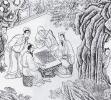If you like reading about philosophy, here’s a free, weekly newsletter with articles just like this one: Send it to me!
This is the fourth and last part of a series on Hesse’s Glass Bead Game. Find the previous parts right here:

Would a Society of Intellectuals Be a Better Place?
Hermann Hesse’s ‘The Glass Bead Game’ may be his greatest novel. It combines a theory of history and education with Zen, and meditations on friendship and duty.
In the first part of this series, we talked about the “age of the feuilleton,” which is essentially our own age: an age of distractions, where knowledge has been degraded into “infotainment,” gossip and listicles. It is amazing that Hesse could so accurately foresee these developments when he wrote his book in the 1940s.

The Province of the Mind
At the centre of Hermann Hesse’s Glass Bead Game is a grand vision of life in Castalia, a province of scholars.
In the second part, we discussed the scholarly province “Castalia,” Hesse’s version of a learned utopia, in which monk-like scholars enjoy the freedom of lifelong research, no questions asked. Of course, the author does ask the question whether this would be a good world or not, and there are all sorts of issues that the books touches upon: do scholars have a responsibility to lead the non-scholarly world? Can this even work? Does the world have a duty to support a learned province like Castalia, and why exactly? Are scholars like those in Castalia better or worse people than those outside? And many more. The book is surprisingly open on the answers – Hesse recognises the problems of his utopia, and, in the end, Josef Knecht leaves Castalia and his high-ranking master’s job to become the private tutor of a boy “outside.”

The Fabled East
Hermann Hesse’s Glass Bead Game contains multiple references to Chinese philosophy and religion. We unpack Hesse’s orientalist utopia.
In the third part, we took a closer look at the role of “Eastern” and Chinese motifs in the book and in Hesse’s work in general, because Chinese culture forms in many ways the basis upon which the idea of the Glass Bead Game is built.
The universe as a game
Looking at the Glass Bead Game, we must keep in mind that Hesse, a non-scientist, a poet, in this book attempts to explain a formal system invented many hundred years in the future by people who were decidedly non-poets – rational scientists with deep knowledge of the natural sciences, but also formal systems, mathematics, …
Read the full article which is published on Daily Philosophy (external link)







